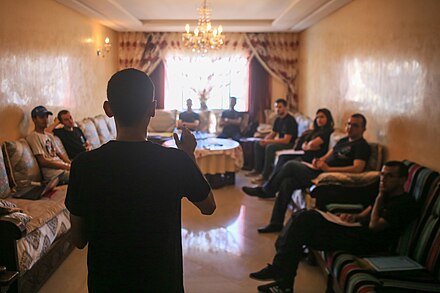Strategy/Wikimedia movement/2018-20/Reports/Movement Strategy Playbook/Decentralize decision-making
| “ | Sometimes taking a step back
from power is a very powerful thing to do. |
” |
There was widespread sentiment from participants that the Wikimedia “movement” has historically been very siloed, and that the opportunity for greater collaboration and a more holistic big-picture view is vital.

- “There’s a sense of common identity and connection that emerges from asking folks to work together, and to engage each others’ needs, limitations, challenges and operations.”
- “Historically, we have worked in silos. Each group has their *own* Wikipedia, with their own inward-looking focus. Hopefully the Movement Strategy process worked to help overcome those silos.”
- “The process was the product, in the sense that we are developing the relationships and competencies to move forward, separate and apart from the actual recommendations. The bigger goal is to build cross-collaborative functionality, because the community is and remains a highly localized set of individual communities.”
Power-sharing and inclusion
edit- “On the one hand we preach being open and collaborative, but on the other we know we can do that better. Historically we tend to hear a lot from Europe and North America, as opposed to Africa, South America and Asia. Voices that haven't been heard over the last two decades are now making themselves heard.”
- “It was very important to raise this urgency, and the urgency for change -- bringing people to the mindset that change is not something to be feared; it belongs to nature, to life, and to us as a movement.”
Momentum vs. process fatigue
edit- “A radically open process takes time. It takes a lot of time, and this can create fatigue for the participants. That’s why the ‘make-or-break’ point going forward is to bring the recommendations to life, to generate and implement positive changes.
- "People are antsy to get going. Many are tired of process and cycle. They want to know: what are we going to do? When are we going to do it?"
- "The most important thing is to keep the momentum, to keep the spirit. This is going to be hard, because of the pandemic. We are unable to have in-person meetings, which have been so valuable to build trust. This is a real risk. We need to find a way to balance that out, bridging the time we are unable to meet in large numbers in person. How do we figure out how to do this meaningfully online?"
- "We’re entering the phase that is the really hard part: changing mindsets and habits. This is now the hard part where we need to be very honest, open and trust each other, and avoid blame when things go wrong."
- "The key bit is: to get real, really quickly. Through practical development of initiative and projects. And doing that in a distributed model, where there are many leaders across the movement and it is not all centrally organized.”
Re-balancing power and decision-making
edit- “In order for the strategy work to live up to its potential going forward, there is a very substantive conversation to be had around power and agency. The upcoming work in front of us to create a Global Council and a Movement Charter are critical parts of this.
- This is an opportunity for the community, affiliates and chapters to manage more of their own affairs. To create more autonomy, self-organization, and self-determination, so that communities and chapters can decide in a more independent way.”
- “There needs to be a model for collective global decision-making. A legitimate decision-making structure for the movement to make decisions for itself, based on decentralization and subsidiarity.”
- “This would be healthy as an exercise in accountability, agency, and trust, and create empathy across these different bodies. It would also be important from a power-sharing perspective, having a body that is explicitly representative of the full global movement, and that helps rebalance away from North American / European communities, so that members of emerging communities have equal voices.”
- “It’s going to be extremely hard, foundational to our future success, and super important. It's a maturation moment.”
Applying lessons learned
edit- “These two milestones around Global Council and Movement Charter *have to* happen in this new people-centred, highly consultative way. It's the *how* we do it that will determine their success.”
- “I think many people were skeptical of this approach to movement strategy. But now we’ve proven that it’s possible. Now I think we might have more political capital to spend on similar processes in the future.”
Communications is key going forward
edit- “All change is about the 'story.' It’s crucial to get the communications and storytelling right for the Transition and Implementation phases of the project. If we don’t get this right, we run the risk of undermining all the work to date."
- “Communications needs to be seen as the key leadership role for this thing going forward. It's a fundamental leadership question, not just a piece of the work.”
- “We’re now shifting into Movement Strategy being owned across the movement — but the coordination of updates and communications across that process still needs to be taken on as a key piece of work for the Foundation.”
Tools and examples for decentralizing decision-making
editDo you have tools, methods or ideas that you, your community or organization use for this? Add them to this section for others to see.